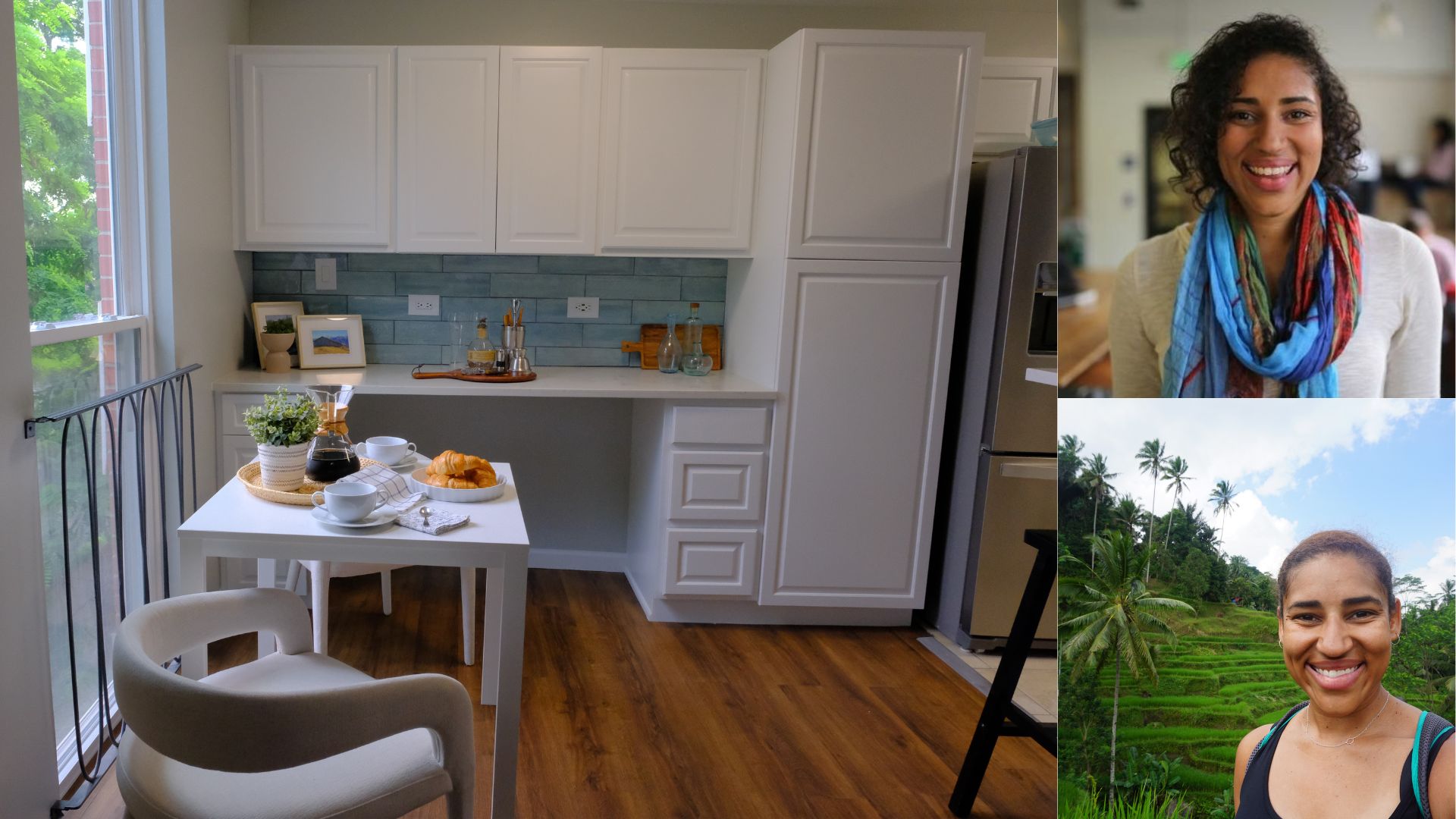
When Iris Gardner was a child, she wanted to be everything. An actor, a cartographer, a model, a poet, an Olympic athlete. "Could you tell I wanted attention as a child?," she laughs, reflecting on her expansive childhood ambitions. But what seemed like scattered dreams was actually the foundation of something deeper. Her ability to hold seemingly contradictory truths about herself would become the driving force of her unconventional career.
By day, she's a strategic operational mind behind MLT (Management Leadership for Tomorrow), using data and systems to advance equity in corporate America. On nights and weekends, she's building her interior staging business, transforming empty houses into warm and welcoming homes to attract the right buyer. She's the data-driven analyst and a creative who once traveled across 17 countries to learn international cooking techniques.
"I have a dual brain," Iris explains. "I have a very ops-minded, data-focused side of my brain, and I have a very creative, storytelling, story-building side of my brain." Rather than viewing these as competing forces, she's learned to see them as equal parts of her professional identity; a concept that’s expressed in the name of her previous business, The Equal Parts.

The Strategy of Quitting
Iris's career trajectory reads like a masterclass in strategic pivoting. From college admissions officer to Google recruiter to nonprofit program manager to entrepreneur, and now corporate strategist—like Iris, each move was against the norm and courageous.
"I'm an advocate of quitting," she declares without hesitation. "Quitting can be the most beautiful, cathartic, opportunistic thing you could do with your entire life. Being comfortable with quitting has given me a life seven times more impactful than if I’d stayed in the same job my entire career.”
She’s not advocating for reckless job hopping. Iris makes a crucial distinction between quitting willy-nilly and intentionally making a decision for yourself to move on and move forward. For example, one such intentional departure came after a concussion forced her to confront burnout at a nonprofit supporting Black and Latinx engineers. Despite being in the center of tech's diversity awakening, she realized the emotional toll of navigating that awakening was unsustainable.
"Would you allow yourself or your daughter or son or mom, whoever it is, to persist in an abusive situation?" she asks. "In any other kind of relationship, you wouldn't recommend that someone stay. Why would you do that in a job or industry?"
The question cuts to the heart of why so many professionals remain trapped in unfulfilling positions. But staying trapped isn’t an option for Iris. Instead, she quit without another job lined up, spent her savings traveling to 17 countries for eight months, and returned to start a culinary business teaching international cooking classes.
Sociology & Self Assurance
There’s a backstory to Iris’s willingness to take the risks that keep most professionals stuck. "There's something messed up here," she realized as a teenager, hearing the story of how her father's jazz talents were overlooked by a high school counselor who pigeonholed him into a sports track based on his race.
The story of the limits that were placed on her father, coupled with the experience of being bused to four different elementary schools AND witnessing segregation in her high school's International Baccalaureate program, led Iris to study politics and sociology in college. Soon enough, all of those experiences planted seeds that would bloom into a career focused on creating more audacious and equitable pathways for herself and others.
What enables Iris to navigate such a diverse professional terrain? "Anyone who only knew me as a child would say that I was very self-assured," she explains. "I knew who I was very early on.” This unwavering sense of self became the anchor that empowered her to hold seeming contradictions without cognitive dissonance. She can be simultaneously strategic and spontaneous, corporate and creative because she refuses to compartmentalize her identity for others' comfort. "I can hold multiple things that seem to be contradictory at once,” she says with confidence. “It just is what it is."

Creating Community Spaces
Iris's current model of maintaining a demanding corporate role while building a creative business is a blueprint for others seeking to honor multiple aspects of their identity. Her staging work is more than a side hustle. It's an expression of values that run through all her work: community and creating spaces where people can thrive.
"I love gathering people together," she says, describing both her corporate team-building and her love of hosting dinner parties. Whether she's helping tech companies recruit diverse talent or staging homes for faster sales, the through-line is consistent: creating environments where others can succeed.
For her long-term vision, Iris sees a full-time brand that includes a real estate investment portfolio with a design service arm, but, true to form, she holds this vision lightly. "I am 100% comfortable with that not being true in three years," she admits. "Sometimes a different opportunity comes along, and that’s more strategic at that moment than whatever your five-year plan happened to be."
Lessons in Holding Both
If you’re wrestling with your own non-linear career path, diverse interests, or professional identity, Iris's story offers several practical insights.
Redefine what strategic planning is for you. True strategy isn't rigid adherence to a five-year plan; it's building capabilities and maintaining flexibility to pivot when opportunities align with your values. Iris's "strategic quitting" required both financial planning and deep self-knowledge.
Question whose approval you're seeking. "Whose definition of success, sustainability, and lifestyle are you trying to hold up?" Iris asks. Sometimes our resistance to change comes not from practical constraints but from outdated expectations, sometimes from ourselves or others.
Honor your complexity. The pressure to pick a lane, choose a side, or commit to a single identity often forces us to abandon parts of ourselves. Iris's refusal to choose between her analytical and creative sides has enriched her career journey, rather than complicated it.
As Iris continues working at the intersection of creativity, business, and community building, she’s the picture of a new model of professional development. Instead of choosing between strategy and creativity, corporate success and artistic expression, she offers a different path: the radical act of holding both.
"This is literally just a moment," she reminds her younger self and others facing career crossroads. "You have a 40-year career." With that perspective, the pressure to get it right the first time dissolves, replaced by curiosity about what comes next and confidence that whatever it is, it will be authentically hers.
-
While others stay stuck in jobs that drain them, join 1000+ professionals finding purpose and building the courage to bet on themselves. Get weekly content, real life stories, and the permission you've been waiting for—delivered straight to your inbox. Your future self will thank you.



